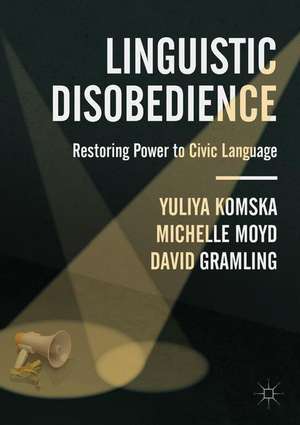Linguistic Disobedience: Restoring Power to Civic Language
Autor Yuliya Komska, Michelle Moyd, David Gramlingen Limba Engleză Paperback – 24 iul 2018
Preț: 152.76 lei
Nou
Puncte Express: 229
Preț estimativ în valută:
29.23€ • 30.41$ • 24.13£
29.23€ • 30.41$ • 24.13£
Carte disponibilă
Livrare economică 24 martie-07 aprilie
Livrare express 08-14 martie pentru 63.89 lei
Preluare comenzi: 021 569.72.76
Specificații
ISBN-13: 9783319920092
ISBN-10: 331992009X
Pagini: 163
Ilustrații: IX, 175 p.
Dimensiuni: 148 x 210 x 10 mm
Greutate: 0.23 kg
Ediția:1st ed. 2019
Editura: Springer International Publishing
Colecția Palgrave Macmillan
Locul publicării:Cham, Switzerland
ISBN-10: 331992009X
Pagini: 163
Ilustrații: IX, 175 p.
Dimensiuni: 148 x 210 x 10 mm
Greutate: 0.23 kg
Ediția:1st ed. 2019
Editura: Springer International Publishing
Colecția Palgrave Macmillan
Locul publicării:Cham, Switzerland
Cuprins
Introduction: Obeying and Disobeying.- Chapter 1: Critique.- Chapter 2: Correction.- Chapter 3: Care.- Epilogue: Finding Our Minds.
Notă biografică
Yuliya Komska is Associate Professor of German Studies at Dartmouth College, USA. She wrote The Icon Curtain: The Cold War’s Quiet Border (2015) and co-edited, with Irene Kacandes, Eastern Europe Unmapped: Beyond Borders and Peripheries (2017).
Michelle Moyd is Associate Professor of History at Indiana University Bloomington, USA. She is the author of Violent Intermediaries: African Soldiers, Conquest, and Everyday Colonialism in German East Africa (2014).
David Gramling is Associate Professor of German Studies and Second Language Acquisition & Teaching at the University of Arizona, USA. His book The Invention of Monolingualism (2016) received the American Association for Applied Linguistics book award for 2018.
Textul de pe ultima copertă
This book asks how we—as citizens, immigrants, activists, teachers—can counter the abuse of language in our midst. How can we take back the power of language from those who flaunt that power to silence or erase us and our fellows? In search of answers, Linguistic Disobedience recalls ages and situations that made critiquing, correcting, and caring for language essential for survival. From turn-of-the-twentieth-century Central Europe to the miseries of the Third Reich, from the Movement for Black Lives to the ongoing effort to decolonize African languages, the study and practice of linguistic disobedience have been crucial. But what are we to do today, when reactionary supremacists and authoritarians are screen-testing their own forms of so-called disobedience to quash oppositional social justice movements and their languages? Blending lyric essay with cultural criticism, historical analysis, and applied linguistics, Linguistic Disobedience offers suggestions for a hopeful pathway forward in violent times.
Caracteristici
Places language at the forefront of civic awareness Provides a theoretical and practical resource for speaking up and inhabiting language in an age of manipulation, uncertainty, and outright lies Highlights the role that marginalized communities have played in critically appraising and in caring for language in times of crisis Argues that we need a new role for, and moral commitment to, the public critique, correction and care of language
